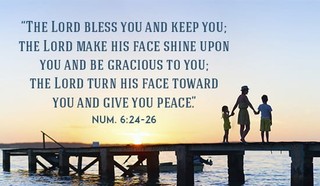- Recent Translations
- All Translations
Bamidbar 6
Share
Settings
Bamidbar 6 Commentary
Chapter 6
The law concerning the Nazarites. (1-21) The form of blessing the people. (22-27)
Verses 1-21 The word Nazarite signifies separation. Some were appointed of God, before their birth, to be Nazarites all their days, as Samson and John the Baptist. But, in general, it was a vow of separation from the world and devotedness to the services of religion, for a limited time, and under certain rules, which any person might make if they pleased. A Nazarite is spoken of as well known; but his obligation is brought to a greater certainty than before. That the fancies of superstitious men might not multiply the restraints endlessly, God gives them rules. They must not drink wine or strong drink, nor eat grapes. Those who separate themselves to God, must not gratify the desires of the body, but keep it under. Let all Christians be very moderate in the use of wine and strong drink; for if the love of these once gets the mastery of a man, he becomes an easy prey to Satan. The Nazarites were to eat nothing that came of the vine; this may teach the utmost care to avoid sin, and all that borders upon it, and leads to it, or may be a temptation to us. They must not cut their hair. They must neither poll their heads, nor shave their beards; this was the mark of Samson being a Nazarite. This signified neglect of the body, and of the ease and ornament of it. Those who separate themselves to God, must keep their consciences pure from dead works, and not touch unclean things. All the days of their separation they must be holy to the Lord. This was the meaning of those outward observances, and without this they were of no account. No penalty or sacrifice was appointed for those who wilfully broke their vow of being Nazarites; they must answer another day for such profane trifling with the Lord their God; but those were to be relieved who did not sin wilfully. There is nothing in Scripture that bears the least resemblance to the religious orders of the church of Rome, except these Nazarites. But mark the difference, or rather how completely opposed! The religious of that church are forbidden to marry; but no such restriction is laid upon the Nazarites. They are commanded to abstain from meats; but the Nazarites might eat any food allowed other Israelites. They are not generally forbidden wine, not even on their fasting days; but the Nazarites might not have wine at any time. Their vow is lasting, even to the end of their lives; the Nazarites' vow was only for a limited time, at their own will; and in certain cases not unless allowed by husbands or parents. Such a thorough difference there is between rules of man's invention and those directed in Scripture, Let us not forget that the Lord Jesus is not only our Surety, but also our example. For his sake we must renounce worldly pleasures, abstain from fleshy lusts, be separate from sinners, make open profession of our faith, moderate natural affections, be spiritually-minded, and devoted to God's service, and desirous to be an example all around us.
Verses 22-27 The priests were solemnly to bless the people in the name of the Lord. To be under the almighty protection of God our Saviour; to enjoy his favour as the smile of a loving Father, or as the cheering beams of the sun; while he mercifully forgives our sins, supplies our wants, consoles the heart, and prepares us by his grace for eternal glory; these things form the substance of this blessing, and the sum total of all blessings. In so rich a list of mercies worldly joys are not worthy to be mentioned. Here is a form of prayer. The name Jehovah is three times repeated. The Jews think there is some mystery; and we know what it is, the New Testament having explained it. There we are directed to expect the blessing from the grace of our Lord Jesus Christ, the love of the Father, and the communion of the ( 2 Corinthians. 13:14 ) yet they are not three Lords, but one Lord.
Bamidbar 6 Commentaries
Chapter Summary
INTRODUCTION TO NUMBERS 6
In this chapter is given the law concerning Nazarites, Nu 6:1,2; which directs what they were to abstain from, from drinking wine, or any strong liquors, from shaving their heads, and defiling themselves with the dead, Nu 6:3-8; and in case of a defilement, directions are given what offerings a Nazarite should bring to be offered for him, Nu 6:9-12; and when the time of his Nazariteship was up, an account is given of what rites and ceremonies should then be performed, Nu 6:13-21; and the chapter is concluded with the form of blessing the children of Israel, to be used by Aaron and his sons, Nu 6:22-27.


